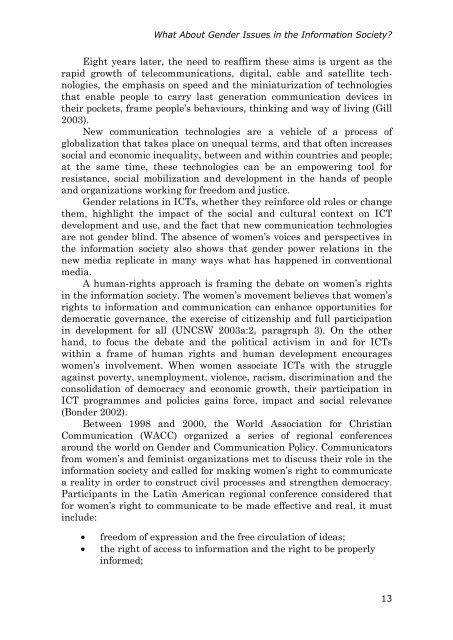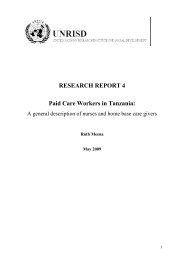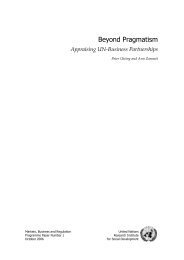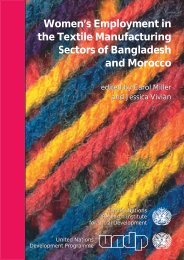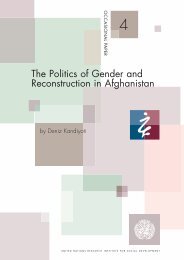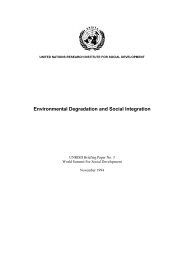communicating in the information society - United Nations Research ...
communicating in the information society - United Nations Research ...
communicating in the information society - United Nations Research ...
Create successful ePaper yourself
Turn your PDF publications into a flip-book with our unique Google optimized e-Paper software.
What About Gender Issues <strong>in</strong> <strong>the</strong> Information Society?<br />
Eight years later, <strong>the</strong> need to reaffirm <strong>the</strong>se aims is urgent as <strong>the</strong><br />
rapid growth of telecommunications, digital, cable and satellite technologies,<br />
<strong>the</strong> emphasis on speed and <strong>the</strong> m<strong>in</strong>iaturization of technologies<br />
that enable people to carry last generation communication devices <strong>in</strong><br />
<strong>the</strong>ir pockets, frame people’s behaviours, th<strong>in</strong>k<strong>in</strong>g and way of liv<strong>in</strong>g (Gill<br />
2003).<br />
New communication technologies are a vehicle of a process of<br />
globalization that takes place on unequal terms, and that often <strong>in</strong>creases<br />
social and economic <strong>in</strong>equality, between and with<strong>in</strong> countries and people;<br />
at <strong>the</strong> same time, <strong>the</strong>se technologies can be an empower<strong>in</strong>g tool for<br />
resistance, social mobilization and development <strong>in</strong> <strong>the</strong> hands of people<br />
and organizations work<strong>in</strong>g for freedom and justice.<br />
Gender relations <strong>in</strong> ICTs, whe<strong>the</strong>r <strong>the</strong>y re<strong>in</strong>force old roles or change<br />
<strong>the</strong>m, highlight <strong>the</strong> impact of <strong>the</strong> social and cultural context on ICT<br />
development and use, and <strong>the</strong> fact that new communication technologies<br />
are not gender bl<strong>in</strong>d. The absence of women’s voices and perspectives <strong>in</strong><br />
<strong>the</strong> <strong>in</strong>formation <strong>society</strong> also shows that gender power relations <strong>in</strong> <strong>the</strong><br />
new media replicate <strong>in</strong> many ways what has happened <strong>in</strong> conventional<br />
media.<br />
A human-rights approach is fram<strong>in</strong>g <strong>the</strong> debate on women’s rights<br />
<strong>in</strong> <strong>the</strong> <strong>in</strong>formation <strong>society</strong>. The women’s movement believes that women’s<br />
rights to <strong>in</strong>formation and communication can enhance opportunities for<br />
democratic governance, <strong>the</strong> exercise of citizenship and full participation<br />
<strong>in</strong> development for all (UNCSW 2003a:2, paragraph 3). On <strong>the</strong> o<strong>the</strong>r<br />
hand, to focus <strong>the</strong> debate and <strong>the</strong> political activism <strong>in</strong> and for ICTs<br />
with<strong>in</strong> a frame of human rights and human development encourages<br />
women’s <strong>in</strong>volvement. When women associate ICTs with <strong>the</strong> struggle<br />
aga<strong>in</strong>st poverty, unemployment, violence, racism, discrim<strong>in</strong>ation and <strong>the</strong><br />
consolidation of democracy and economic growth, <strong>the</strong>ir participation <strong>in</strong><br />
ICT programmes and policies ga<strong>in</strong>s force, impact and social relevance<br />
(Bonder 2002).<br />
Between 1998 and 2000, <strong>the</strong> World Association for Christian<br />
Communication (WACC) organized a series of regional conferences<br />
around <strong>the</strong> world on Gender and Communication Policy. Communicators<br />
from women’s and fem<strong>in</strong>ist organizations met to discuss <strong>the</strong>ir role <strong>in</strong> <strong>the</strong><br />
<strong>in</strong>formation <strong>society</strong> and called for mak<strong>in</strong>g women’s right to communicate<br />
a reality <strong>in</strong> order to construct civil processes and streng<strong>the</strong>n democracy.<br />
Participants <strong>in</strong> <strong>the</strong> Lat<strong>in</strong> American regional conference considered that<br />
for women’s right to communicate to be made effective and real, it must<br />
<strong>in</strong>clude:<br />
• freedom of expression and <strong>the</strong> free circulation of ideas;<br />
• <strong>the</strong> right of access to <strong>in</strong>formation and <strong>the</strong> right to be properly<br />
<strong>in</strong>formed;<br />
13


